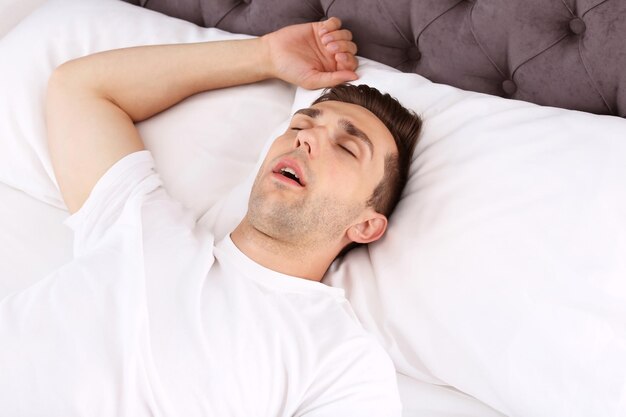Sleep apnea is a common yet often undiagnosed sleep disorder that affects millions of people worldwide. It is characterized by repeated interruptions in breathing during sleep, which can lead to fragmented sleep and reduced oxygen levels in the body. Recognizing the early signs and symptoms of sleep apnea is crucial for early intervention and management. Here are some of the key indicators to watch for.
1. Loud Snoring
One of the most recognizable signs of sleep apnea is loud, chronic snoring, often punctuated by periods of silence when breathing stops. This occurs because the airway becomes obstructed during sleep, leading to difficulty in airflow. If you or your partner notices loud snoring, especially if it is accompanied by choking or gasping sounds, it may indicate sleep apnea.
2. Excessive Daytime Sleepiness
Individuals with sleep apnea often experience excessive daytime sleepiness (EDS) due to disrupted sleep cycles. This can manifest as a constant feeling of fatigue, difficulty concentrating, and a tendency to fall asleep during the day, even in inappropriate situations (e.g., while driving or at work).
3. Morning Headaches
Frequent morning headaches can be another symptom of sleep apnea. These headaches may be caused by changes in oxygen levels during the night or increased carbon dioxide retention, leading to vascular changes in the brain. If you consistently wake up with headaches, it’s important to discuss this with a healthcare provider.
4. Difficulty Staying Asleep
People with sleep apnea often experience insomnia or difficulty staying asleep (also known as maintenance insomnia). This can occur due to the frequent awakenings that happen as the body struggles to restore normal breathing. Waking up multiple times during the night can severely impact sleep quality.
5. Frequent Nighttime Urination
Another symptom is nocturia, which is the need to urinate frequently during the night. This can result from the body’s stress response to apnea events, leading to increased urine production. If you find yourself waking up multiple times to urinate, it may be related to sleep apnea.
6. Irritability and Mood Changes
Sleep deprivation caused by sleep apnea can lead to irritability, mood swings, and difficulty managing stress. The impact of poor sleep on emotional well-being can make individuals more prone to anxiety and depression.
7. Memory Problems
Cognitive functions such as memory and attention may be impaired due to sleep disturbances associated with sleep apnea. Individuals may find it hard to remember things or may feel mentally foggy, impacting daily life and responsibilities.
8. Dry Mouth or Sore Throat
Waking up with a dry mouth or sore throat can indicate that you are breathing through your mouth during sleep due to airway obstruction. This can lead to discomfort and difficulty swallowing upon waking.
If you or someone you know is experiencing these early signs and symptoms of sleep apnea, it is essential to seek medical advice. A healthcare provider can conduct a thorough evaluation, which may include a sleep study, to determine if sleep apnea is the underlying cause. Early diagnosis and treatment can significantly improve sleep quality, overall health, and well-being. Don’t ignore the signs; prioritize your sleep health for a better quality of life.










